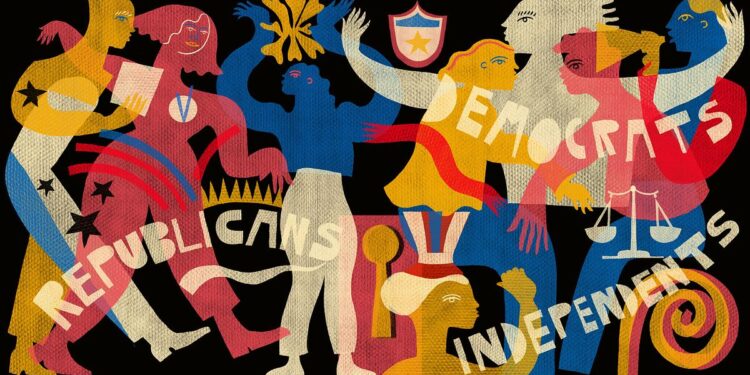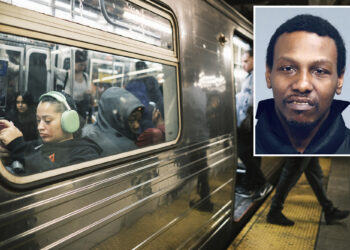November’s election — the first to feature a prominent candidate with a slew of felony convictions — comes at an inflection point in the voting rights landscape for the formerly incarcerated.
Roughly 2 million people with felony convictions have regained the right to vote since the late ’90s, according to an analysis by The Sentencing Project, a research and advocacy organization working to reduce the number of people behind bars in the U.S. These restoration efforts — legislative changes, ballot initiatives, and executive actions in 26 states and the District of Columbia — were largely bipartisan.
Despite the sea change, incarcerated people are rarely asked for their political views. Most will be eligible to vote once they return home. In 2020, The Marshall Project’s first-of-its-kind political survey revealed strong support for Trump, shattering a commonly held notion that people behind bars would overwhelmingly support Democrats.
This time around, we wanted to know what people in prison and jail thought about an election that has been cast as a contest between “a prosecutor and a convicted felon.”
More than 54,000 people in 785 prisons and jails in 45 states and the District of Columbia responded. Here is what we found:
- Most respondents said they would vote for Trump, and support was particularly strong among White men. A substantial minority of Black men said they’d vote for Trump, too, if given the chance.
- As previous surveys showed, a large share of people behind bars from all racial backgrounds don’t identify with either major political party — instead identifying as independent.
- A majority of those who identified as Democrats and independents said the country is ready for a woman president. Republicans are more divided on the question.
- When Harris replaced President Biden as the nominee, she won more support, appealing to a subset of Trump supporters or people who said they wouldn’t vote in a previous version of the survey.
Public sentiment about disenfranchisement as a punishment for crime is changing, too. A majority of voters said they’d support a law guaranteeing voting rights for people 18 and older, including those in prison or on probation or parole, according to a 2022 poll conducted on behalf of several criminal justice advocacy organizations. Just a few years before that, a majority of Americans said they were against people voting from behind bars.
Public policy, however, still lags behind public opinion. In 2023, Rep. Ayanna Pressley and Sen. Peter Welch introduced a bill that would grant people in prison the right to vote while incarcerated. But it has stalled in the Judiciary Committee. A bill that would do the same for prisoners in Washington state faced a similar fate earlier this year. The District of Columbia restored the right to vote to people in prison in 2020. Still, only a handful of states allow some people in prison to cast a ballot. And although most people in jail can still vote on Election Day, few do because of numerous obstacles.
Felony disenfranchisement also affects voting habits of those without felony records. Research consistently shows that voter turnout is lower in communities in which a large share of people go to prison. And even minimal contact with the legal system — a traffic stop or a weekend in jail — can keep people from showing up at the ballot box.
What’s more, nearly 113 million people — almost half of all adults in the U.S. — have an immediate relative who is or has been in prison or jail. And roughly 79 million people in the U.S. have a criminal record of some kind. Yet many survey respondents said the way incarceration shapes Americans’ lives is often ignored during campaign season.
“They barely even speak of the prison population, when we have more people locked up than anywhere in the world,” Donarico Caudle, a survey respondent incarcerated in North Carolina, said in an interview. “I understand that we have a lot of things going on in the world, but mass incarceration is a very, very serious matter.”
How We Conducted This Survey
The Marshall Project partnered with two tablet providers in prisons and jails to conduct this survey. Ultimately, we ran two surveys, asking respondents to answer a few additional questions once Harris became the Democratic nominee. Participation in the survey was voluntary, so it’s important to keep in mind that responses are coming from a self-selecting group of people who may already be politically engaged and following the news.
Roughly 63% of more than 47,000 respondents who shared their race identified as people of color or mixed-race, with 26% identifying as Black, 20% as Latino, 13% as Native American and 17% percent as Asian or other races. Another 37% identified as White alone, and about 7,000 respondents did not give any race information. (The non-White race numbers exceed 63% because respondents could select multiple races.)
Most have completed some high school and are between 26 and 55 years old. Eighty-two percent are men, 12% are women and about 1.5% are transgender or gender non-conforming. Thirty-two percent have not been convicted and are awaiting court dates in a county jail, or did not know whether they had been sentenced or not. More than half of the roughly 25,000 people who provided an answer said they’ll spend anywhere from 10 years to the rest of their lives in prison.
Our survey is intended to be a snapshot of politics behind bars, but it has limitations. Respondents skewed whiter than the overall prison population. Black people are incarcerated in state prisons at five times the rate of White people, according to an analysis of state prison populations by The Sentencing Project. In 12 states, more than half the prison population is Black, the analysts found.
As a result, the survey is not representative of the overall prison population. So instead of focusing solely on the respondents as a whole, we looked for trends across race, gender, party affiliation and other demographic categories to ensure our reported results were meaningful. We also surfaced as many individual voices and opinions as possible. In future iterations, we hope to provide a more representative view. Our research partner at Columbia University, assistant professor of sociology David J. Knight, is currently developing survey weights to make the survey representative of the demographics, types of facilities, and geography of the United States jail and prison population.
An Independent Streak Behind Bars
Of the more than 54,000 survey respondents, 35% said they identify as independents. Outside of prisons and jails, independents have consistently made up the largest share of the American electorate. Over the last three years, as approval of Biden has waned, support for independents ticked up, tying the last recorded high of 43% in 2014.
For most Americans, identifying as independent does not mean an outright rejection of either political party. Additional polling shows that a majority of people who identify as independent still lean toward one major political party or another.
By contrast, half of the incarcerated independents said they lean toward neither party. The rest are roughly equally divided among Republicans and Democrats.
The independent streak comes at a cost to Democrats, who make up 18% of respondents. This election has strengthened the sentiment that Democrats do not have incarcerated people’s best interests at heart. Many respondents said they take issue with the way the party has made Trump’s felony convictions a central feature of Harris’ election campaign. Others reject Biden for his championing of the 1994 crime bill. And some flatly reject Harris because she was a prosecutor.
Limited access to news in prison and jail is also a factor. Several survey respondents said they struggled to get solid information while locked up. Some said they could not answer survey questions about Harris or Trump because they didn’t have access to enough facts to form an opinion.
“I can’t afford the news subscription fee. I am only able to read article titles,” one respondent wrote, referring to news apps available on prison tablets. Another respondent told us in an interview that staff regularly censored newspapers, especially if there were stories about criminal justice or other topics officials did not want them to see.
For Janelle Suthers, who is incarcerated at Perryville women’s prison in Arizona, limited news access is disempowering. She said she can get mainstream stories that cover the big news of the day on the TV. But she is frustrated she can’t do deeper research on topics that matter to her. During an election with such high stakes, the lack of information makes her anxious. “It is isolating. It is frustrating. It makes you feel powerless,” she said in an interview.
Despite their stated rejection of both political parties, Trump holds sway over independent survey respondents. Roughly 46% said they would vote for him if given the chance. Another 29% said they’d vote for a third-party candidate or wouldn’t vote at all.
The Trump Factor
Trump’s policies are at odds with most criminal justice reformers. He supports the death penalty for people convicted of drug dealing and has been critical of efforts to curb police violence. And he has repeatedly made racist comments about crime.
Despite Trump’s punitive approach, he enjoys robust support from people behind bars — especially among White men.
“I’d say there is a majority of open support for Trump within the inmate population here, especially among the whites,” wrote Enrique Banda-Garcia, a Trump supporter who is incarcerated in Washington State Penitentiary. “And yes, we understand that Republicans are very tough on criminals and even tougher on us during our incarceration, nevertheless, Trump remains very popular here.”
Incarcerated people’s political views are often shaped by the racial segregation in their facilities. The segregation dictates which news programs people watch and with whom they’ll spend the vast majority of their time while locked up. Our previous survey revealed ardent support for Trump among White men. Many said they formed their opinions by consuming conservative news media. Across both surveys, respondents routinely remarked that White people in prison tend to watch Fox News or Newsmax, while Black people gravitate toward CNN or MSNBC where the channels are available.
Some respondents were hopeful that Trump’s experience with the legal system would make him more sympathetic to people behind bars. Donarico Caudle, who is incarcerated in North Carolina, said in an interview that he thought Trump was going to take a look at problems after going through his own trial. “There are things that you see when you look at this legal system that’s dirty,” Caudle said.
Trump’s trial for paying hush money to a porn star before the 2016 election was closely watched by respondents of both parties. Seventy-four percent of Republicans and 70% of Democrats said they watched the trial “very” or “somewhat” closely. But respondents were sharply divided about how the former president should be punished for his crimes.
Many respondents who said Trump should be incarcerated cited basic fairness: They were sentenced to prison time for their crimes, so Trump should be, too. “The law should be the great equalizer,” one respondent wrote. “No one should be above another in terms of the range of punishments nor given leniency simply because they’re a certain way (I.e. richer or a celebrity).”
For others, incarceration was a strategic choice. If the former president goes to prison, maybe he would be compelled to make changes when gets out. “Donald Trump needs to see with his own eyes what normal people suffer here in prison, and how unjust is all the laws and the prison system,” one respondent wrote.
Compared to people outside prison, incarcerated survey respondents were more inclined to be lenient toward Trump. Only a third of incarcerated people surveyed thought he should be sentenced to prison for his crimes, compared to about half of people on the outside, according to an Associated Press poll. Even those who disliked Trump cited their feelings about prison being harmful as a reason to oppose his incarceration.
Like their peers on the outside, a significant majority of incarcerated Republicans, roughly 73%, said it was “definitely” or “probably” good for Trump to be a dictator on day one of his presidency. Seventy-four percent of Republicans on the outside felt the same.
Ready for a Woman
When Biden dropped out of the race, we distributed a second survey. The first survey showed minimal support for Biden with only 18% of respondents saying they approved of the way he was handling his job. Incarcerated Democrats tended to be more critical than those on the outside, with just 38% approving of the president compared to 61% of Democrats in the general electorate.
With the second survey, we wanted to gauge if people behind bars would have a more favorable view of Harris — and of the potential for a woman president — despite her record as a prosecutor.
Incarcerated survey respondents believe the country is ready for a woman president around the same rate as the general electorate. Polling on the outside shows that 79% of Democrats and 35% of Republicans believe the country is ready for a woman president. Behind bars, 79% of Democrats and 34% of Republicans also said yes. Independent respondents were less certain, with 55% saying they thought the country was ready.
Openness to a woman president doesn’t necessarily translate into support for Harris. Survey respondents were split on their view of the vice president. Respondents held favorable and unfavorable views at the same rate: 35%. The rest said they had no view or had never heard of her.
Tough on Crime?
For many survey respondents, Harris’ record on crime loomed large. The more familiar respondents were with her record as a prosecutor, the less favorable their view of her. About 56% of respondents who said they were “very familiar” with the vice president held an “unfavorable opinion.” And 46% of respondents who said they were “familiar” with her felt the same way.
Harris’ record on crime is hotly contested. She has styled herself as a “progressive prosecutor,” pointing to her adoption of programs that steered some people away from prison. The Trump campaign has cast the vice president as “too soft” on crime during her tenure in San Francisco. Legal analysts have argued that Harris’ record is mixed at best, noting how difficult it is to define what makes a prosecutor progressive.
Survey respondents who said they were familiar with her record did not see her as a progressive or too soft on crime. Of those who said they were “very familiar” with her record, 52% believe she was “tough on crime,” with only 13% saying she was “not tough enough on crime.” The same trend applies to respondents who were “familiar” with her record. Roughly 43% said she was tough on crime; 11% said she wasn’t tough enough. The remaining respondents said she was just right on crime or held no opinion.
Nearly 18% of survey respondents are incarcerated in California. For some, their opinion of the vice president is informed by personal experience.
At 18, Brandon Baker was sentenced to life in prison for a home invasion. His sentence was enhanced because of gang activity. He is now 42 years old and incarcerated in California State Prison. Like many of his peers, Baker thinks Harris would be a good president, but he is wrestling with supporting the woman who was attorney general in a state that has rejected his bids for earlier release. He said Harris helped drive mass incarceration and needs to take responsibility for the harm she has caused.
“I just wish Kamala Harris would just get out in front of it and say: ‘You know, what I did was wrong, this is how we can rectify it,’” he said. “And I haven’t heard her do that.”
Crime, “a Felon” and “a Prosecutor”
Attacking an opponent’s record on crime is a campaign staple. Republicans are advocating for policies that remove rights from people with felony convictions, despite their own candidate having a record. Democrats have adopted language like “felon” that denigrates people with a criminal record, despite having a base that is disproportionately affected by the legal system.
When Harris picked Tim Walz as her running mate, the Trump campaign quickly attacked his record on voting rights for Minnesotans with felony convictions. As governor, Walz signed a bill restoring voting rights to an estimated 55,000 Minnesotans who had served time in prison.
The new law brings Minnesota’s felony disenfranchisement laws in line with those in New York, where the former president is convicted of 34 felonies. He is only eligible to vote in Florida (where he is registered) because New York only bars people with felony convictions from voting while they’re incarcerated.
The GOP has tried to revoke voting rights for the incarcerated across the country. In Nebraska, the Republican attorney general issued an opinion that a 2024 law to restore voting rights to people immediately after leaving prison was unconstitutional. In Virginia, the Republican governor rescinded a policy of automatic voting rights restoration to people who finished their felony sentences. Election officials in Tennessee have blocked nearly all rights restoration by adding more requirements that disqualify people with felony convictions.
Most notably, the Republican-led legislature in Florida erected nearly insurmountable barriers to rights restoration after residents overwhelmingly decided to restore the vote to some people with convictions in 2018.
The Harris campaign cast the election as between a “felon and prosecutor,” in a video ad that aired during the Democratic National Convention in September. The news media as well as prominent Democrats embraced the description. On the campaign trail Harris boasted that she has taken on “perpetrators of all kinds,” and knows “Donald Trump’s type.”
Despite his track record of flouting the norms of American democracy, Democrats have focused on Trump’s felony convictions in their campaign. The former president is far from typical of those ensnared in the criminal legal system. But the Harris campaign has weaponized the stigma of the label “felon” to suggest it’s the reason why he is unfit to hold public office.
Many survey respondents said the stigma undercuts their full reintegration into society.
“How can I expect to be taken seriously by my government/society,” asked one survey respondent who is incarcerated in Arizona, “when there’s such a strong expectation for Trump to be discarded for being a felon?”
Learn about how The Marshall Project is covering the 2024 election’s criminal justice and immigration issues across the U.S. and in our local news teams’ cities.



























